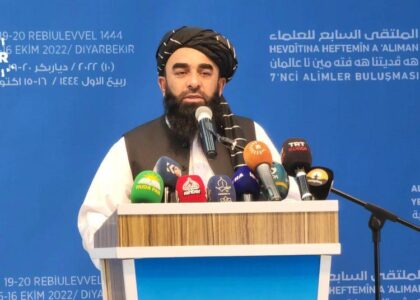
Turkish government is a close friend, says Taliban leader at a controversial pro-Hizbullah meeting
A senior Afghan Taliban leader addressed Islamic scholars at a meeting in Turkey’s southeastern province of Diyarbakır on Saturday, saying the Taliban sees the Turkish government as a close friend. Representatives from jihadist foundations and media outlets funded by the ruling party of Turkish President Recep Tayyip Erdoğan also attended the event.
The annual conference, titled “Islamic Scholars Meeting,” was organized by the Union of Islamic Scholars and Madrasahs (İTTİHADUL ULEMA), an affiliate of Turkish Hizbullah’s political front, the Free Cause Party (HÜDA-PAR). The Iran-backed Hizbullah is designated as a terrorist group that seeks to establish an Iranian-style mullah regime in Turkey.

Taliban spokesman Zabihullah Mujahid is greeted by Enver Kılıçarslan, the chairman of the Union of Scholars and Madrasahs.
The Taliban’s deputy minister of information and culture, spokesman Zabihullah Mujahid, told the audience that Islamic scholars led the ranks of the jihad against the enemy in Afghanistan and that the victory in 2021 was made possible thanks to this. Stating that scholars should establish good relations and unite with the Islamic world, the Taliban spokesman said it is the duty of scholars to spread the religion of Islam.
Mujahid asked the participants from Turkey, Syria, Jordan, Lebanon, Iran, Iraq and Libya to make efforts to ensure the official recognition of the Islamic Emirate of Afghanistan by other Muslim countries, criticizing the current situation.
Emphasizing that they see the Turkish government as a close friend, Mujahid also thanked Turkey for the aid sent from Ankara after the recent natural disasters in his country.
Ali Muhiuddin Qara Daghi, (known as Ali Karadaği in Turkey), general secretary of the International Union of Muslim Scholars (IUMS), a Muslim Brotherhood-linked organization funded by Qatar, who often poses as a VIP at Turkish government events, was among the speakers at the Diyarbakır event.
A staunch supporter of President Erdoğan, columnist Yusuf Kaplan of the Yeni Şafak daily, which is owned by a businessman in the president’s inner circle, stated that HÜDA-PAR is a matter of pride for Muslims and provides a safety valve in the region, referring to its counterbalance of the pro-Kurdish Peoples’ Democratic Party (HDP), which President Erdoğan has long accused of being a political front for the outlawed, separatist Kurdistan Workers’ Party (PKK).

Erdoğan and Kaplan (R).
However, a noteworthy detail from the event was that the countries of participants coming from northern Syria and Iraq were specified as Kurdistan.
Enver Kılıçarslan, chairman of the Union of Scholars and Madrasahs, was convicted in February 2002 of membership in Hizbullah and sentenced to seven years, six months. He was among 26 defendants sentenced to various prison terms including eight who received life sentences for murder and armed attacks.

Kurdistan was shown as an independent country on the promotional posters for the event.
According to court documents, Kılıçarslan went to Iran in 1987 for training in ideology with the help of Iranian operatives he met in Diyarbakır. While he was studying at the Hüccetiye Madrasah in the city of Kum, he was introduced to Turkish Hizbullah leader Hüseyin Velioğlu, after which Kılıçarslan started to operate under his command in Turkey.
Nordic Monitor previously reported that while many in Turkey tend to see the Taliban’s takeover of Afghanistan as a US defeat and are concerned about an influx of refugees rather than what’s going on in the distant country, clerics supported by the Islamist government who are influential over the ruling party’s grassroots do not hesitate to express their support for the brutal Taliban, another example of Turkey’s increasing radicalization.
The Turkish Embassy in Kabul was the first foreign mission to reopen, with Ankara re-establishing its diplomatic presence in Afghanistan shortly after the Taliban’s takeover of the country in 2021.
A statement made by President Erdoğan that “Turkey has no problem with the Taliban’s beliefs. I think we can get along better,” just after the Taliban seized power, was seen as a warm message to the new regime.
Along with the Turkish diplomatic mission, the Maarif Foundation, an organizations that serves as the long arm of Erdoğan’s government abroad, is also continuing its activities in Afghanistan in cooperation with the new regime.

On October 14, 2021 a Turkish delegation headed by Foreign Minister Mevlüt Çavuşoğlu and an Afghan delegation led by Mawlawi Amir Khan Mutaqi, the then-acting minister of foreign affairs of the Interim Government of Afghanistan, met in Ankara.
On September 30, 2021 the Turkish government opposed a Parliamentary Assembly of the Council of Europe (PACE) resolution that sought the engagement of member states in Afghanistan conditional on the Taliban’s respect for the human rights of minorities, women and LGBTI people.
In a post shared on its official Twitter account, Turkey’s Consulate General in Mazar-i-Sharif announced on July 15 that the Qur’an was being recited in 15 madrasas (religious schools) under Taliban control as part of events for Democracy and National Unity Day, which was established in Turkey after a controversial coup attempt in 2016. The reception organized by the Turkish Embassy on the anniversary of the abortive putsch was attended by high-level participants from the interim Taliban government.
Source: Nordicmonitor






You must be logged in to post a comment.